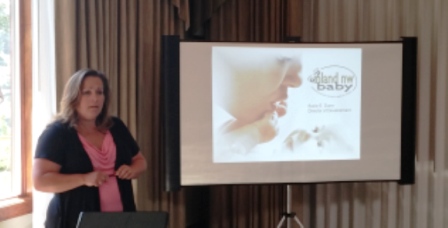NWBaby - Suzie Dunn
Spokane North Notes
A weekly bulletin of the Spokane-North Rotary Club
Aug. 4, 2014
Editors: Chuck Rehberg and Sandy Fink
Photo: Eric Johnson
Program coordinator: Jim Minkler
Back to School time: The club’s annual supply drive to stock the supply cupboard at Holmes Elementary is under way. Coordinator Melody Farance said an average of $70 from each member is needed to raise the $2,000 needed to buy tissues, folders, pencils, crayons scissors, markers, glue sticks and packs of wide-ruled paper.
Poor families often face a diaper dilemma
Low-income families with infants face plenty of financial challenges, including, according to Suzie Dunn, diapers.
 Dunn, the development director for Inland NW Baby, told the club Aug. 4 about the area’s growing need for garments to catch baby bowel movements.
Dunn, the development director for Inland NW Baby, told the club Aug. 4 about the area’s growing need for garments to catch baby bowel movements.
One attentive listener was club President Jon Heideman, whose family includes a five-week-old diaper dandy.
Dunn, in a rapid-fire presentation, laid out the problem.
“One in three families struggle to buy diapers for their babies,” she said, and the cost, per kid, is about $100 a month. Babies who wear diapers too long are exposed to rashes, eczemas and even staph infections, she said.
Plus, crying babies cranky over the slow frequency of diaper changes, create other pressures on the parents, often with negative consequences, Dunn said.
Thus Inland NW Baby makes its “diaper drives” a priority.
The idea came in 2009 to Jesse Sheldon, then 14, a Central Valley student who read a Time magazine article about what poor people did to extend the life of diapers.
But first, if you are still reading this, a little diaper history.
In ancient times, according to “The Diaper Jungle” website, in warm climates and mostly agrarian settings, parents didn’t bother with diapers for the little ones. They just tried to get them outside before nature called.
The first diapers were made of leaves, grass, even animal skins. Rabbit skin was popular for parents; not so much for the rabbits.
In Elizabethan times, cloth diapers were commonly used, but often not changed for days, as waste materials accumulated over time.
With urbanization, diapers were used as much to protect the furniture as for good hygiene and to protect the baby’s skin.
Cloth diapers, especially cotton, were popular until the 1940s, when cotton was declared a strategic war time commodity and cellulose was used, creating the first disposable diapers.
Various improvements followed, but enough history. Fast forward to present day problems.
Low-income families – and Dunn says 26 percent of families in the Inland Northwest are below the federal poverty guidelines – have special challenges.
For example, food stamps cannot be used to buy diapers and there is no federal assistance funding either. Poor families, and many don’t have washing machines, can’t launder diapers in public laundries. So, she said, up to 48 percent of poor families delay changing diapers and 32 percent reuse diapers. Also, day care facilities require parents to bring a full-day’s supply of diapers.
Enter young Mr. Sheldon from the City of Spokane Valley. His diaper drive ideas have morphed into a five-year-old “Stuff a Bus” collection effort. And Inland NW Baby has a 5K and 10K “Sugar Rush Run,” which ends with participants touring a 40-foot-by-100-foot tent filled with chocolate treats and other delights. This year’s run is Nov. 8.
Sheldon was honored in 2012 as the Washington State high school volunteer of the year. New York Giants quarterback Eli Manning presented the Prudential Spirit of Community award and a $1,000 prize to Sheldon.
Dunn said even better than donated diapers is donated cash, because then her agency can bargain with diaper manufacturers for discounted bulk supplies. Bulk buys often are at 12-15 cents a diaper, versus 25-27 cents a diaper in the stores, she said.
The agency, located at 15303 E. Sprague, provides up to 40 diapers a month to families certified as needy by various social agencies.
“The 40 diapers buys them about a week and a half,” Dunn said. “Then, spending about $60 a month for diapers doesn’t look as bad as spending $100 or more.
She noted the area no longer has a cloth diaper service. “We are trying to get one going again.”
Inland NW Baby’s all-volunteer staff has fielded 7,000 diaper requests and has distributed more than 200,000 diapers since 2010, Dunn said.
Prior to her current role, Dunn, a Spokane Valley native, coordinated the Baby Fair and is marketing director for Mother’s Haven in Coeur d’Alene.
She and her husband have three children, boys aged 15 and 7 and a daughter, 8 – so no diaper days to deal with at home.
Along with diapers, Inland NW Baby accepts donations of socks, shoes and gently-used clothing, infant to size-6, and blankets, bibs and summer hats.
